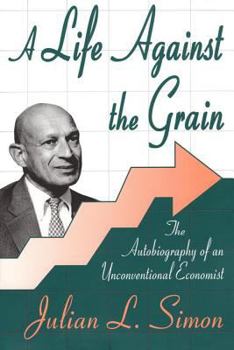A Life Against the Grain: The Autobiography of an Unconventional Economist
Select Format
Select Condition 
Book Overview
In his long and distinguished career as a writer and scholar Julian Simon came to be known as one of the leading--and most controversial--authorities on population economics. An immensely productive writer, his work is unified by a basic core belief: that human intellect and ingenuity are ever-renewable resources in the use and preservation of natural resources. Inevitably, Simon's position provoked the hostility of doctrinaire environmentalists,...
Format:Paperback
Language:English
ISBN:0765805324
ISBN13:9780765805324
Release Date:September 2003
Publisher:Routledge
Length:378 Pages
Weight:1.30 lbs.
Dimensions:1.1" x 5.9" x 9.3"
Customer Reviews
2 ratings
How Julian Simon came to challenge so much conventional wisdom
Published by Thriftbooks.com User , 16 years ago
Julian Simon (1932-1998) rightly called himself an "unconventional economist." Perhaps his best known accomplishment was to conceive how overbooked airline passengers could volunteer to receive a payment in return for boarding a later flight ("the airline oversales auction system"). He was an important voice in the debate over immigration, replacing conjecture, posturing, and stereotypes with economic analysis. And, largely single-handedly, he dismantled the modern Malthusianism of "population control." His autobiography is also unconventional, not the usual summary of a professional life preceded by a chapter or two on his youth. In a 337-page narrative, Simon spent 160 pages tracing his life to the end of his four post-Harvard years in the Navy. He wanted to describe the background and experiences -- summed up in the title as "A Life Against the Grain" -- that led him to challenge conventional wisdom and think problems through to new conclusions. I liked the book's focus on his youth, formative experiences, temperament, and self-reflection. A chapter on how he dealt with years of depression is frank and revealing. So are his thoughts on the value of a Sabbath day, even though Simon described himself as a "radical atheist along the lines of Buddha." The book gives a reader plenty to think about. Here's just one example. His early reading and professional studies led him to believe that mankind and the earth confronted a grave crisis of overpopulation. Many at the time were considering what kind of coercive measures might be appropriate to reduce population growth. But walking through Arlington one day, he visited the famous Marine Corps Memorial -- the Felix de Weldon statue of the raising of the flag on Iwo Jima. There he recalled words from Chaplain Rabbi Roland Gittelsohn's famous eulogy after the battle -- "Somewhere on this plot of ground there may lie the man who could have discovered the cure to cancer. Under one of these Christian crosses, or beneath a Jewish Star of David, there may rest now a man who was destined to be a great prophet to find the way, perhaps, for all to live in plenty, with poverty and hardship for none." Simon passed the moral insight from this realm -- war and faith -- into another realm -- economics and demography. He began to think that it is people -- not farmland, not natural resources, not investment -- who are the "ultimate resource." That spark of an idea undergirded his later research and thinking on population issues. This and many more insights can be found in Simon's unconventional autobiography. -30-
The life of the Doomslayer
Published by Thriftbooks.com User , 21 years ago
The world lost a very special person on February 8th, 1998. I remember hearing of his death the day after it happened and it was the first time I felt truly sad at the passing of someone I had never met. Julian Simon was an economist who studied a broad range of issues but he will most certainly be remembered for his breakthrough work in population economics, showing that population growth correlates with increases in human well being, not decreases. Simon turned doomsayers like Thomas Malthus on their heads and was dubbed the "doomslayer" in a Wired Magazine interview about a year before his death. Although Simon died well before publication, his wife, Rita, was able to put together this book, working from about 900 (!) pages of manuscript that Julian wrote before his death. Unfortunately, the book seems to suffer a bit from poor editing and typographical mistakes, but that's a minor nit. I'm not a fan of biographies in general, so much of the childhood years bored me, but the chapters on his career and research are fascinating and, alas, way too short. I couldn't help but get the feeling that there were mounds of interesting anecdotes on his career and research that were left out for space reasons. It's too bad; most people who would read it would be most interested in that part. Fortunately, unlike some other autobiographies written by economists, Simon does discuss how he evolved in his thinking over the yearsThe book covers all the areas that Simon is well known for, including population studies, immigration, treatment of depression, advertising and the mail order business and, of course, Simon's brilliant idea for solving the problem of overbooked planes. This last item was a stroke of genius and Simon deserves a place of honor for that alone. The solution came to him in the mid-sixties, but it wasn't until 1978, when an economist was appointed head of the Civil Aeronautics Board that it was put into use. Simon was baffled as to why it took so long, but an obvious explanation never occurs to him: the airline industry was a heavily regulated, government-enforced cartel, so there was less of an incentive to innovate.






